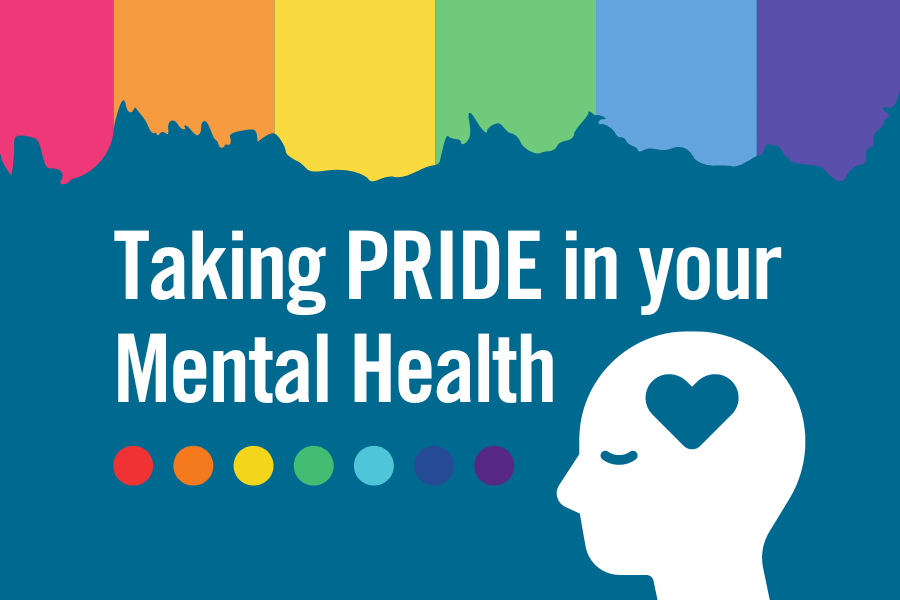Taking PRIDE in your mental health

While we’ve seen much progress for 2SLGBTQ+ rights and general attitudes toward the queer community in the past few decades, recent backlash and politically charged vitriol in our communities and across the globe has been taking a toll. How can 2SLGBTQ+ people (and the people who love them) take care of their mental health?
Being 2SLGBTQ+ and mental health
According to Centre for Suicide Prevention, survey data and studies show that LGB youth are at a higher risk of poor mental health including suicidal ideation and suicide attempts than their heterosexual peers. Transgender people are twice as likely to think about and attempt suicide compared to LGB people.
Being queer is not a mental illness. Queer people face many unique stressors that put them at higher for risk for mental health struggles and suicide ideation. These can include institutional prejudice, discrimination, bullying, lack of family support, homelessness, lack of access to mental health supports, healthcare or gender-affirming care, the trauma of being ‘othered’, the stress of being different and gender dysphoria.
Unfortunately, it has been a dangerous time for the 2SLGBTQ+ community. Statistics Canada reported a 64% rise in crime against the 2SLGBTQ+ community in 2021. Recent years have been marked by anti-2SLGBTQ+ protests and threats. No amount of self-support or self-care can address the changes needed at a society and systematic level to protect 2SLGBTQ+ people. Self-care is not a substitute for community-care. But it’s still important to address the things you can control to take care of your mental health. Being mentally healthy allows 2SLGBTQ+ people and allies to have the energy and motivation to continue fighting for a better world.
Ways to protect your mental health
Connect
Whatever you’re going through, you don’t need to go through it alone. Check out local 2SLGBTQ+ groups. Connect with folks online. Find your community. Choose your family. Connecting to the queer community means you’re not alone and less likely to give up! It means learning from each other and advocating for each other! Community means support.
Related: Know your history! Witness the resiliency and progress of your community, your family, your people. It will give you hope and strength. Calgary Gay History Project is a great place to start.
Set boundaries & self advocate
Stand up for yourself. Look into policies and protections offered by your school, workplace, health provider, etc. Block people online who share things that hurt your mental health. When you have the mental capacity, speak up when someone says something ignorant. But remember, balance is necessary and you also need to protect your joy. It’s okay to excuse yourself when a conversation becomes too draining.
Be mindful of your safety. Consider the level of risk involved in speaking up in different situations.
Unplug
It is important to stay up-to-date on issues that affect you, but you also need to give yourself time to unplug. The news and social media are filled with stories of discriminatory acts, hate crimes, and violence against the 2SLGBTQ+ community. This kind of news keeps you apprised of the state of things, which can help you protect yourself and fight for your rights, but having all that negativity coming at you is also detrimental to your mental health. Find time to focus on things that bring you joy. Spend time offline. Give yourself time to unwind. Spend time in nature. Find a creative outlet. Read books.
Related: Check out our guide on developing a personalized self-care plan.
Physical health
Although we tend to separate physical and mental health, they are intrinsically connected. Don’t forget to take care of your physical health! Eat food that nourishes your body. Get enough sleep. Find a physical activity that you enjoy. Find affirming healthcare professionals and get checked up or seek medical care when needed.
Take pride in your identity
Don’t seek validation from the wrong people! Don’t let others define you. You are the only one who gets to say who you are. Trust yourself. Don’t feel shame when you don’t follow gender norms or follow expected stereotypes. Talk kindly to and about yourself. Treat yourself the way you would treat a dear friend. Remember, you have value!
Find specialized support
Members of the 2SLGBTQ+ community faces unique challenges, which means not just anyone can provide effective assistance in certain situations. Still, it’s important to remember that help is available. Take the time to look for affirming support and specialized resources. You may want to seek out a queer therapist or a therapist who specialize in inclusive, affirming care.
You can contact 211 by phone, text or chat 24/7 to find up-to-date resources for 2SLGBTQ+ individuals. Here are a few:
Remember that Distress Centre is here for you. If you need to talk, contact us by phone, chat or text to connect with a highly trained responder. Youth can contact ConnecTeen to receive youth peer support by phone, chat or text.
At Distress Centre, we are committed to cultivating an environment marked by equity, diversity, inclusion and justice. This is an ongoing journey for our agency, and one that does not end.




